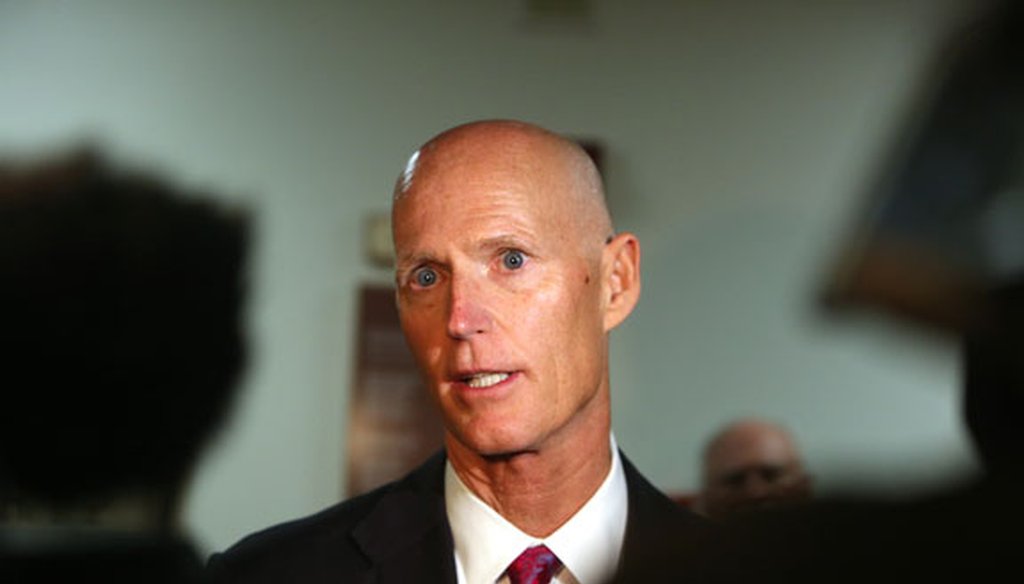Stand up for the facts!
Our only agenda is to publish the truth so you can be an informed participant in democracy.
We need your help.
I would like to contribute

Florida Gov. Rick Scott answers questions after a meeting of the Florida Senate Finance and Tax Committee on Jan. 11, 2016. (Tampa Bay Times photo)
Gov. Rick Scott's claim about $1 billion in tax cuts needs some background
Despite lawmakers virtually ignoring his budget wish list during the 2016 legislative session, Gov. Rick Scott is boasting about fulfilling a campaign promise to cut taxes by $1 billion in his second term.
Scott took credit for the fiscal feat both before and after signing the Legislature’s wide-ranging tax-cut package, HB 7099. "Over the past two years, Florida has cut more than $1 billion in taxes," an April 13, 2016, press release from the governor’s office read.
Scott had pledged to hit the billion-dollar mark in tax reductions during his successful 2014 re-election campaign, mostly by giving breaks to businesses and limiting property tax growth. In his March 15 press release announcing his intention to sign the Legislature’s budget, Scott said he’d kept his promise with $1.2 billion in tax cuts over the first two years of his second term.
Scott has repeated this claim several times in one form or another. But have taxes really gone down by more than $1 billion in two years, like he says? It depends on how you look at what the Legislature has done, but the changes haven’t happened the way Scott wanted.
Tallying the taxes
When we asked Scott’s office to break down their budget math for us, they pointed to a chart in their March 15 press release, without further detail:
We were able to verify the figures from Scott’s office based on changes passed by the Legislature the last two years. The Florida Office of Economic and Demographic Research compiles an annual list of how much tax revenue will be affected by bills passed during that year’s legislative session (these can change as the fiscal picture becomes clearer). The House also analyzed HB 7099 to estimate how much the bill would change tax receipts.
Cell phone & TV tax cut: In 2015, the Legislature passed a 1.73 percentage point reduction in the state’s communications services tax, a charge on consumer cell phone, cable and satellite bills. That amounted to a $21 annual reduction on a $100 monthly cell phone and cable bill. Scott had wanted to cut the tax by $120 million, something we’d rated a Promise Kept on our Scott-O-Meter.
Property tax reduction: This one is tricky, because it’s more of a tax shift than a tax cut. Scott also is taking credit for a solution he didn’t want.
During the 2016 session, the House and Senate agreed to increase per-pupil education spending for K-12 students, something Scott had wanted.
Scott initially wanted the bump in education funding paid almost entirely through higher local property tax collections, not with general revenue. (Scott had previously proposed limiting property tax increases with a constitutional amendment, a campaign promise he has so far ignored.)
Higher property values meant that collections would increase whether lawmakers raised the key millage rate for local property tax dollars for schools or kept it the same. Instead, the Legislature cut the local rate and paid for the $428 million difference they needed with general tax revenue.
Legislators mostly referred to this as "tax relief," and not a tax cut. We’ve rated a similar statement Mostly True, because the change altered future collections, instead of cutting current collections. Property owners, however, are still shielded from a tax hike.
Senate Appropriations Chairman Tom Lee, R-Brandon, told the Tampa Bay Times that if you include this revenue swap, Scott "technically" had reached $1 billion in tax cuts. But that’s dependent on Scott accepting a plan he opposed. The Legislature has to revisit education funding every year, too, so this will no doubt change.
Back to school sales tax holiday: Scott counts these breaks from sales tax on school supplies as a cut. These aren’t permanent cuts, because the Legislature has to approve whether there will be sales tax holidays each year.
His figures do jibe with state estimates. The totals are different, in part, because the 2015 holiday was 10 days long, while the 2016 holiday will only be three days long. The terms of exempt items also differs between the two years.
Manufacturing machinery and equipment: Getting rid of this tax was another Scott promise, going back to his first term. The sales tax originally was cut back with a limited exemption in 2012, but the following year was suspended by legislators for three years. Starting in 2014, the tax would not apply through April 30, 2017. Scott pushed to make the suspension permanent and in 2016, the Legislature agreed. The Scott-O-Meter rated this a Promise Kept.
College textbooks: Scott proposed making college textbooks exempt from sales tax, suggesting it would save the average student about $60 per year. The Legislature agreed to the exemption for the 2015-16 fiscal year, but it was not renewed in the 2016 session.
Other tax cuts: Scott’s office did not include specific dollar figures for other tax breaks, fee changes and provisions that went down over the last two years.
In 2015, the Legislature removed sales taxes on gun club membership fees, put a $60,000 cap on taxes for board repairs, and gave businesses tax credits for pollution cleanup and research, among other measures. For 2016, legislators gave veterans’ organizations an exemption on food and drink sales taxes, phased out an asphalt tax over three years for government projects, and tinkered with taxes on cruise ship alcohol and tobacco sales, pear cider, and aviation fuel, among other changes.
That’s just a sample of the tax changes over the last two years that Scott’s office counted. The figures are in the ballpark and add up somewhere north of $1 billion. Whether he can take credit for the total is a tougher question.
Experts have told us that counting on things like tax credits and sales tax holidays means consumers have to spend money first before enjoying any benefits. Many of these changes also are temporary or narrowly focused. And remember that local governments may have to raise taxes to account for a change in revenue.
Meanwhile, the Legislature has balked at several tax changes Scott has wanted, including eliminating the state’s corporate income tax — a major Scott request in 2016 that would have cost the state $770 million annually — and phasing out the sales tax on commercial leases.
Our ruling
Scott said, "Over the past two years, Florida has cut more than $1 billion in taxes."
The figures are pretty accurate compared to state estimates for tax changes during 2015 and 2016. But there’s some question whether you can really consider all of the measures tax cuts. While some of the alterations are permanent, many of them are temporary exemptions or target very specific beneficiaries. Scott also has to ignore some of his earlier proposals and count a plan for education funding that is the opposite of what he wanted to top the $1 billion mark.
The statement is accurate but needs some clarification. We rate it Mostly True.
Our Sources
Gov. Rick Scott, "Governor Rick Scott Announces Novolex Expansion Will Create 25 New Jobs," April 13, 2016
Tampa Bay Times, "Gov. Rick Scott promises $1 billion in tax cuts for second term," Aug. 29, 2014
PolitiFact Florida, "Rick Scott says he cut taxes 'more than 40 times'," March 3, 2015
South Florida Sun-Sentinel, "Lawmakers pass $429 million tax-cut package," June 16, 2015
Florida Department of Revenue, "College Textbook Exemption," June 26, 2015
Tampa Bay Times, "Gov. Rick Scott and Legislature on collision course over school funding," Sept. 17, 2015
PolitiFact Florida, "Scott says state revenues are growing after tax cuts," Feb. 4, 2016
Tampa Bay Times, "It's a wrap: Florida Legislature passes $82.3 billion budget and ends on time," March 11, 2016
Gov. Rick Scott, "Governor Rick Scott Announces the Florida First Budget," March 15, 2016
Florida House of Representatives, Final bill analysis for HB 7099, March 17, 2016
PolitiFact Florida, "Legislature provided $428 million worth of property tax relief, Sen. Don Gaetz says," March 17, 2016
News Service of Florida, "Gov. Rick Scott signs tax cuts, including shorter back-to-school holiday," April 13, 2016
Sunshine State News, "Rick Scott Signs Nearly $1 Billion Tax Cut Package Into Law," April 13, 2016
Tampa Bay Times Buzz blog, "Gov. Rick Scott signs downsized tax cut package into law," April 13, 2016
Florida Office of Economic and Demographic Research, Measures Affecting Revenue reports, accessed April 21, 2016
Florida House of Representatives, HB 7099, accessed April 21, 2016
Interview with Lauren Schenone, Scott spokeswoman, April 21, 2016
Browse the Truth-O-Meter
More by Joshua Gillin
Gov. Rick Scott's claim about $1 billion in tax cuts needs some background
Support independent fact-checking.
Become a member!
In a world of wild talk and fake news, help us stand up for the facts.






































